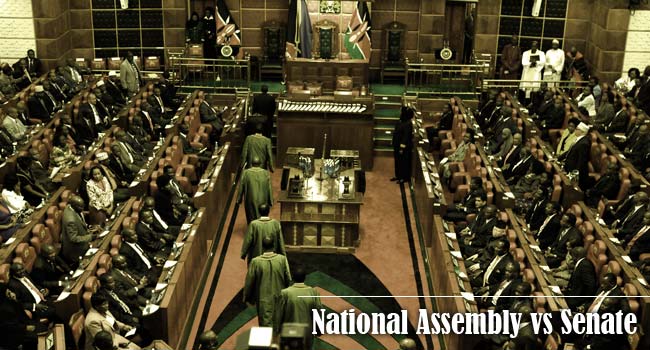National Assembly vs Senate

The latest move by the Senate to sue the President in the Supreme Court after he assented to the Division of Revenue Bill indicates that the stalemate between the Senate and the National Assembly is widening. The Senate referred to the President's assent as a fundamental violation of the Constitution. The Bill was forwarded to the President by the National Assembly; however a plea to the President by the Senate to ignore it became futile. This move is alleged to be a threat to the realization of devolution. The Senate now wants the Supreme Court to give an advisory opinion on the right procedure.
Division of Revenue Act is the chief law for the sharing of resources between the National government and the 47 County governments. The National Assembly and the Treasury had agreed on Sh210 billion, but the Senate added an extra Sh48 billion to ensure delivery of services in Counties was not affected once the national government stops providing for them. However when the Bill came back to the National Assembly, MPs did not consider the senators' input and retained the initial Sh210 billion, leading to their present conflict.
President Kenyatta's assent of the Division of Revenue Bill means that the 47 Counties will share Sh210 billion as approved by the National Assembly and not the Sh258 billion suggested by the Senate. The President justified his actions by explaining that it was important to facilitate timely conclusion of budgetary process in order to avert the risk of bringing Government business to a halt.
Article 95(4a) of the Constitution states "The National Assembly determines the allocation of national revenue between the levels of government..."
Article 96 (2 & 3) of the Constitution provide that the Senate participates in the law-making function of Parliament by considering, debating and approving Bills concerning counties, as well as determining the allocation of national revenue among counties including exercising oversight over national revenue allocated to the county governments.
While the Senate insists that the President contravened Article 96, the National Assembly maintains that this is their preserve, as the Senate's role is to determine allocations among counties through the Counties Allocation Bill as outlined in Article 96(3) of the Constitution.
The Senators and Governors feel that the National Government is out to undermine them and consequently threaten to seek public approval to change the Constitution through a referendum. They seek to collect one million signatures so as to amend the Constitution to protect the Senate and devolution from Executive and National Assembly interference.
The senators particularly want to amend Article 110 of the Constitution which spells out Bills concerning county governments. They also want amendments to Article 111 which gives the National Assembly powers to amend or prevent special bills originating from the Senate.
The senators are also planning to remove the requirements stipulated in Article 113 of the Constitution which states; "...disputes arising from bills passed either by the Senate or the National Assembly should be referred to a mediation committee."
The Swahili proverb 'fahali wawili wakipigana nyasi huumia' translated to mean when two bulls are at war it is the grass that suffers, cannot fail to be invoked in the ongoing combat. The tussle is at the expense of citizens who are eagerly awaiting the benefits from devolution .The leaders who were voted in should put aside their selfish interest and work from a united front in order to steer our national interests to a greater level. It is also important for citizens to keep the leaders they appointed on their toes to perform their duties and not only fight for more money.
The Constitutional definition of Leadership is about servant hood rather than possessing and wielding power. Therefore, any actions by Parliament should be in tandem with serving the people to ensure the objects of devolution are realized.


